Dental Implants – Denver, CO
The Modern Solution to Replace Missing Teeth

Are you looking for a more permanent, stable, and long-lasting alternative to traditional dentures or bridges to replace your missing teeth? Dental implants are becoming increasingly popular because of the variety of unique benefits they offer by restoring the entire structure of missing teeth. To learn whether you’re a good candidate for this treatment, call our dental office today to schedule a consultation.
Why Choose Paradise Dentistry Denver for Dental Implants?
- Soothing, Spa-Like Atmosphere
- Dentist with 17+ Years of Experience
- iTero Digital Impression System
What are Dental Implants?
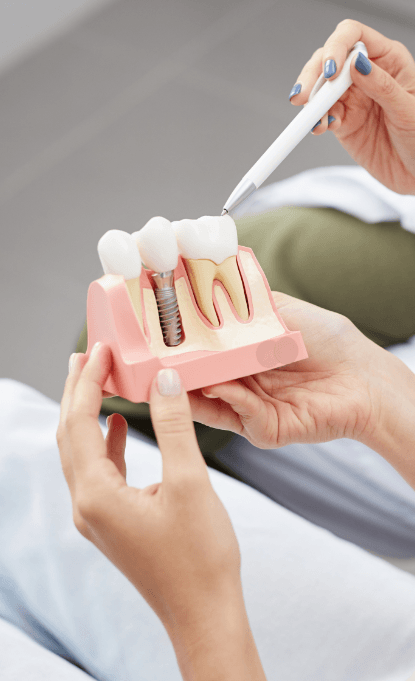
Dental implants themselves are small titanium posts that are placed below the gum line to restore the missing roots of your teeth. Due to the biocompatible nature of the material, they’re able to directly fuse with the jawbone to provide it with stimulation and blood flow to keep it from deteriorating over time. Once this process is complete, our team can then restore your smile by attaching lifelike, custom-crafted restorations on top.
The 4 Step Dental Implant Process
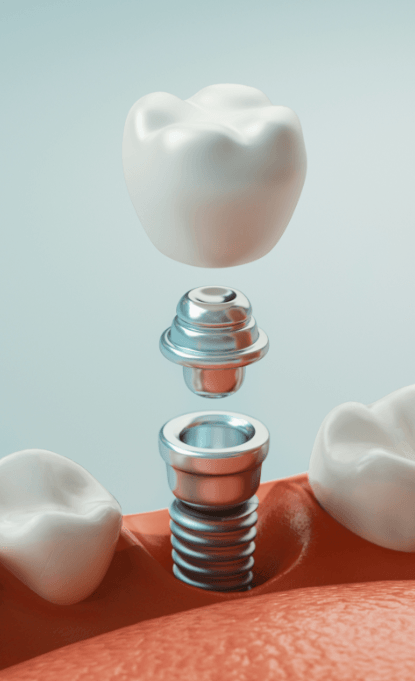
Getting dental implants requires a multi-step process that takes months to complete. While that may seem like a long time, many patients find the long-term benefits to be worth all the time and effort. At our practice, we partner with a trusted outside specialist for your oral surgery. Every patient’s journey may look a little different, but for the most part, the four basic steps are the same across the board. Below, you’ll learn more about what to expect from the dental implant process.
Initial Dental Implant Consultation

During the consultation, Dr. Soltani will examine your mouth, ask you about the desires you have for your smile, and develop a customized treatment plan to address your unique situation. If you have any underlying oral health problems, you’ll need to address them first before planning the rest of your dental implant treatment. Some common preliminary procedures include gum disease therapy, tooth extractions, and bone grafting. Once those are taken care of, you can move forward with the process.
Dental Implant Surgery

Our dental office partners with expert oral surgeons to make dental implant surgery as successful and smooth as possible. They’ll make small incisions in your gum tissue to access the jawbone, then insert each dental implant at precise locations and angles. Afterward, your gums are sutured shut. Protective caps are placed over your dental implants to protect them while you heal.
Dental Implant Osseointegration & Abutment Placement
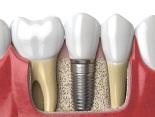
Once your implants are placed, they’ll undergo a natural process called osseointegration, where they’ll fuse with your jawbone. Usually, it takes about three to six months for the titanium posts to successfully integrate with the surrounding bone tissue. Afterward, you’ll return to our dental office so we can attach small, metal connector pieces called abutments to your implants. These allow us to secure your personalized crown, bridge, or denture into place.
Delivery of Dental Implant Restorations

Your artificial teeth are designed based on impressions of your natural smile that have been captured and sent to a dental laboratory. A team of experienced ceramists will create your restorations from natural-looking materials that closely resemble your tooth enamel. After your permanent crown, bridge, or denture has been crafted, we’ll attach it to your abutments to secure them in place and complete your smile. Once you leave the office, you’ll be ready to show off your newly improved grin that very same day!
Benefits of Dental Implants

Dental implants have only become more and more popular over the last few decades as people have discovered the advantages of new teeth that are permanently held in place by artificial tooth roots. Since dental implants are so unique compared to other forms of tooth replacement, they offer a number of benefits that you wouldn’t get with a regular dental bridge or denture. During your consultation, we can go into detail about how dental implants can enhance your everyday life, as well has how they can benefit you in the long term.
Day-to-Day Benefits

- A Full Diet: With traditional dentures that rest on the gums, it can be difficult to enjoy steak and other foods that require a lot of chewing. But when your new teeth are attached to dental implants, they provide stability and chewing strength comparable to natural teeth, and as a result you’ll be able to eat all of your favorite foods with ease.
- Simple Maintenance: Dental implants don’t require you to buy any special products to take care of them. In fact, you don’t have to change your oral hygiene routine at all; you can simply brush and floss like you always have.
- Confidence: It’s much easier to feel good about your smile when you know that there’s no risk of your teeth slipping at the wrong moment. Dental implants look and feel natural, and that can go a long way towards improving your overall confidence in your grin.
Health Benefits

- Strong, Healthy Jawbone: You may not realize it, but your teeth are constantly stimulating your jawbone in order to prevent it from resorbing into the rest of your body. Dental implants can provide the stimulation that was previously provided by your natural teeth, allowing you to keep you to maintain a healthy jawbone.
- Better Nutrition: Since dental implants let you eat anything you want, you don’t have to worry about a lack of chewing power preventing you from getting proper nutrition on a daily basis.
- Improved Hygiene: Since dental implants are easier to clean than other forms of tooth replacement, they can potentially lower your risk of oral health issues. You’ll have much less trouble getting rid of the harmful plaque that can potentially cause gum disease and other problems.
Long-Term Benefits

- Long-Term Success: Dental implants have a 95% success rate even after they’ve been in your mouth for over a decade. It’s by far the best option if you want to make a long-term investment in your new teeth.
- Longevity: The average lifespan of a traditional denture or bridge is around 10 years. Meanwhile dental implants can potentially last the rest of your life as long as you take good care of them. That means that you won’t have to pay for replacements nearly as often – if you need them at all.
Who Dental Implants Can Help

Now that you know a few of the many benefits of dental implants, you might be wondering if you’re a good candidate. Since this state-of-the-art tooth-replacement solution can help patients who are missing one tooth, a few teeth in an arch, or all of their natural teeth, it’s possible the answer is “yes!” Below, you will find some helpful information, including the factors that are considered when determining whether or not someone is a candidate.
Who Is a Good Candidate for Dental Implants?

The best way to determine whether you’re a good candidate for dental implants is to visit us for an initial consultation. We’ll take a look at your medical history, examine your mouth, learn about your daily habits, and, if you qualify for the treatment, we’ll create a custom-tailored timeline that we can walk you through. That way, you know exactly what to expect during the process. Depending on your tooth loss, we may suggest one of the following implant restorations:
Missing One Tooth
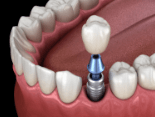
For a single missing tooth, we use a single dental implant! The first step is placing the implant below the gumline. After it has fused with the jawbone and we attach an abutment, we can fill the gap in your smile with a custom-made dental crown. The size, shape, and shade of your restoration will be completely custom-made to ensure it blends in seamlessly with your surrounding teeth too. That way, it doesn’t draw unwanted attention to your smile or feel bulky.
Missing Multiple Teeth
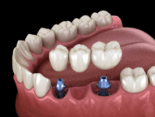
Previously, patients struggling with multiple missing teeth in a row had one option: a traditional dental bridge. Thanks to advancements in technology and dentistry, we can now fill the open space with two dental implants on either side of the gap. We can also secure a partial denture with dental implants, restoring the strength of your smile and your self-confidence in the process!
Missing All Teeth
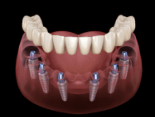
Traditional dentures are held in place with natural suction or a special adhesive. Although effective, some patients experience embarrassing slippage when they talk, laugh, or eat. If that’s the case for you, then ask our dental team about implant dentures! That way, we can attach your restoration to your jawbone with four to eight dental implants. In short, with an implant denture, you won’t have to worry about slipping, shifting, or not being able to eat certain foods.
Maintaining & Caring for Your Dental Implants

Dental implants really can keep your smile full, healthy, and beautiful for a lifetime. That said, they’ll only do so when given proper care. The prosthetics, you see, need the same upkeep as natural teeth! They could fail from damage or oral infection otherwise. Fortunately, our practice has your back: here are some simple precautions and tips on dental implant care. So long as you follow them, you can trust your new grin to last a long while.
Make Oral Hygiene a Priority
Dental implants can’t get cavities – they’re artificial, after all. Still, these prosthetics do require that you practice good oral hygiene.
Remember, implants exist alongside your natural teeth and gums. Consequently, they could fail if you develop a tooth infection or gum disease. You’d then have to replace them with even-newer teeth.
To keep the above from happening, ensure your whole mouth stays clean. In particular, brush your teeth twice daily, floss between them once daily, and rinse them with mouthwash as needed.
Eat a Healthy Diet
As you might know, implants restore much of your bite force. They thus allow you to eat a wide range of foods. Even so, try to stick to a mouth-healthy diet as best you can.
Some foods, you see, pose a slight risk to implants. Hard ones like pretzels or jawbreakers can chip them. Meanwhile, sticky and sugary stuff – especially candy – can get wedged between your implants and decay surrounding teeth.
As an alternative, stick to healthier foods with safer textures. Leafy greens and lean proteins are perfect; their nutrients prevent gum disease and strengthen your jaw.
Break Bad Habits
It isn’t just hygiene and diet that can cause implant failure. At times, bad oral habits do so as well. As such, refrain from these practices as best you can.
One such habit to break is smoking. Tobacco products, in fact, slow recovery from implant surgery and promote gum disease. Continual use of them, then, may trigger treatment failure.
Pressing hard objects against your teeth is another no-no. Whether you’re biting nails or chewing ice, you could chip or break an implant.
Protect Your Dental Implants
Thanks to using titanium and porcelain, implants are both strong and durable. However, keep in mind that they’re not indestructible. For that reason, you’ll need to protect them from external injury.
Wearing a custom mouthguard is likely your best bet. One designed for sports would prevent dental chips and cracks. Meanwhile, a nightguard for sleep could keep your implants safe from tooth grinding.
Schedule Regular Dental Checkups
For effective implant care, you’ll need to attend regular dental checkups. These visits ensure your restorations work properly.
At each of these six-month appointments, a dentist can monitor your oral health and spot issues early. From there, they’ll treat problems before anything can threaten the implants.
Understanding the Cost of Dental Implants

The cost of dental implants is different for everybody. After all, some people will need multiple dental implants to replace an entire row of teeth while others will only need a single implant and a dental crown to fill in the empty space in their smile. It’s only natural that the price would be different based on the situation. We’ll discuss the factors that go into the overall cost of dental implants during your initial consultation, and we’ll give you an estimate of how much you can expect to pay for your own treatment.
Preliminary Treatments & Dental Implant Surgery

Some people might need bone grafts to prepare their jaws to support dental implants or gum disease therapy to ensure that their mouth is in good health before the surgery. Preliminary treatments such as these can add to the overall cost of the dental implant process, although in many cases they are often partially covered by dental insurance.
Dental implant surgery has a separate cost that depends on the location of the surgery site and whether sedation is used during the treatment. A separate oral surgeon will place your dental implants, so keep that in mind when calculating the cost of implants.
The Parts of Your Dental Implant

The cost of dental implants varies based on:
- The number of implants being placed. Normally, you need one implant to replace a single tooth, at least two implants to replace multiple teeth, and four or more implants to replace an entire arch.
- The type of restoration that the implants will support. A single dental crown does not cost the same as a bridge or denture.
- The material used to make the dental implant (which is normally titanium).
- The brand of implant used. There are various implant manufacturers that offer a variety of brand specific benefits. Be sure to ask about the type of implant being placed in your jaw and any brand-specific benefits.
How Dental Implants Can Save You Money

When you’re trying to save as much money as possible on replacement teeth, you might think getting traditional dentures or bridges instead of implants is the obvious choice. But what you may not realize is that dental implants can pay for themselves several times over. Not only do they offer a lot of benefits that other tooth replacements can’t match, but they can last for many decades, meaning you’ll spend less time – and money – getting replacements over the years.
Does My Dental Insurance Cover Dental Implants?

Normally, your insurance plan won’t pay for dental implant surgery. That said, there are exceptions, and even plans that don’t cover implants might still help pay for related preliminary treatments. It’s therefore worth checking with your insurance carrier to see what coverage is available before scheduling your first dental implant consultation.
Making Dental Implants Affordable

Patients who don’t have dental insurance can sign up for our in-house membership plan, which lets you reduce your out-of-pocket costs for a variety of treatments without headaches such as deductibles and copays. We can also help our patients apply for financing through CareCredit, which makes it easier to fit many different treatments into your budget. Speak with our team if you’d like to know more about your options for making dental implants as affordable as possible.
Dental Implant FAQs
Are Dental Implants Safe?
For most patients with good health, dental implants are very successful when placed by a qualified professional. If you have low jawbone density or gum disease, your implant dentist can fix these problems to make dental implant surgery safer and more successful. If you have diabetes, cancer, or other medical conditions that could make surgery/healing risky, we can discuss that during your consultation.
How Long Do Dental Implants Last?
Dental implants are one of the most permanent solutions for missing teeth, capable of lasting well over 30 years. Of course, their exact lifespan depends heavily on your oral health and lifestyle. You can help your upgraded smile’s durability by brushing twice a day along with daily flossing and rinsing with an ADA-approved mouthwash. Make sure you visit our dental team every six months for a checkup and cleaning as well!
How Long Does Dental Implant Surgery Take?
It depends on how many implants you’re receiving at once. Generally, placing a single implant takes 1-2 hours. This includes the time needed to administer anesthesia and dress you for a sterile surgical atmosphere.
Do Dental Implants Feel Natural?
Once they are placed in the jawbone, dental implants will feel exactly like the roots of your original teeth. The implants themselves have no nerve endings. Any sensations that you feel in that area – like heat, cold, or pressure – come from the gums surrounding the implants.
What Can Cause Dental Implants to Fail?
Dental implants usually fail for one of two reasons: peri-implantitis and failed osseointegration. Peri-implantitis is a type of gum disease that develops from poor oral hygiene, damaging the jawbone and soft tissue. Meanwhile, failed osseointegration is exactly as the name implies – when the implant fails to integrate with the jawbone successfully. A few other causes of dental implant failure include chronic teeth grinding, poor oral hygiene, certain medications, and health conditions like diabetes and cancer.
Will I Have to Take Off Work for Dental Implant Surgery?
In most cases, patients typically only need to take a day or two off work to get dental implants. Of course, every case is unique, meaning the exact amount of time you’ll need to take off will be based on your specific situation. If you work a physically demanding job, you should ideally take three to four days off. Strenuous exercise could divert blood from the implant site and delay healing.




